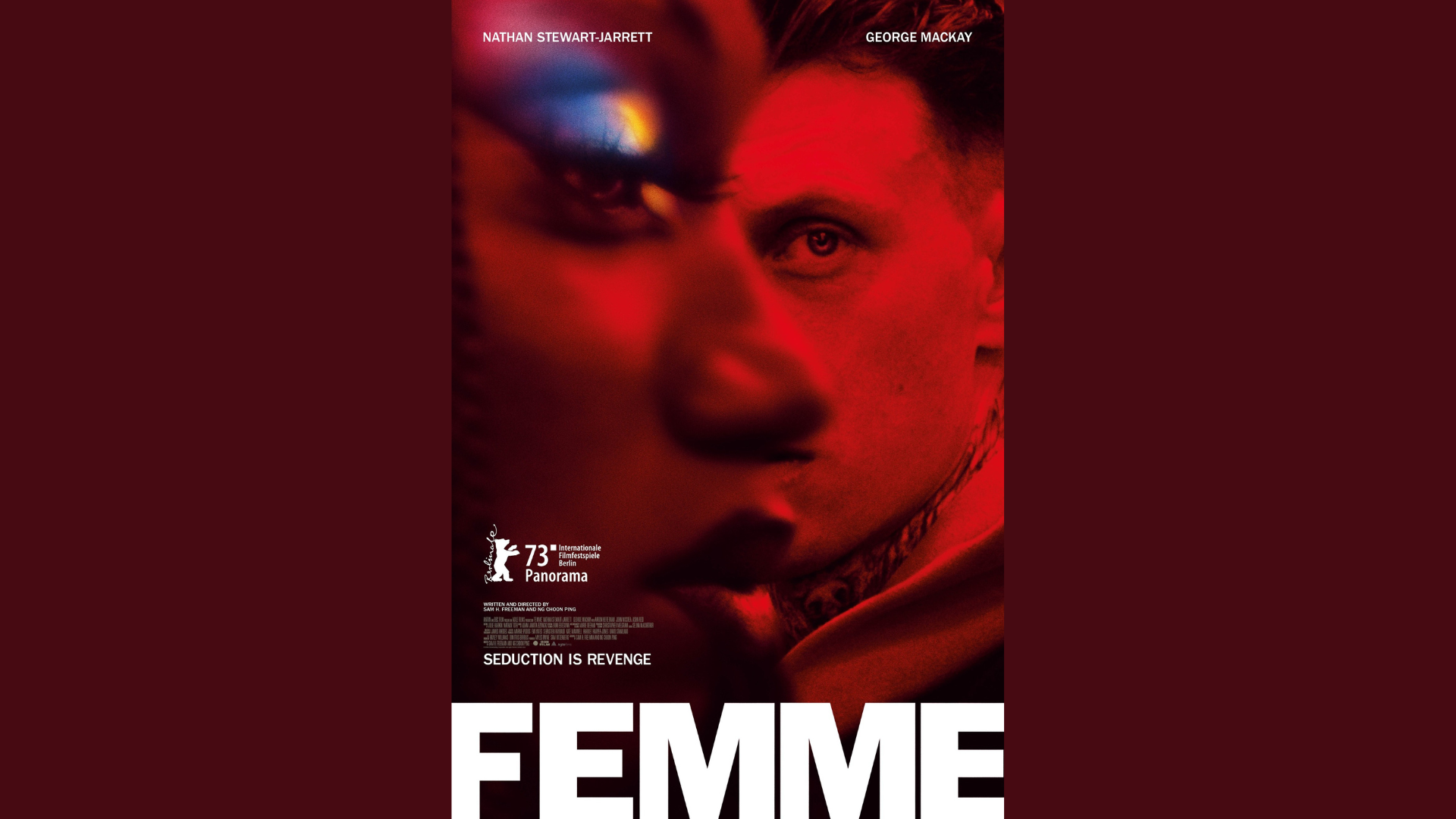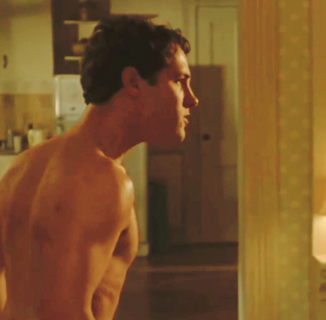A woman walks through a grimy street at night. Neon signs and flickering lamp posts light the way as she hugs her shoulders in the cold night air. A group of thugs appear behind her, attacking her right there on the street. Jump forward three months to a man’s descent into London’s seedy underbelly where he plots the attacker’s downfall with a dangerous plan that could destroy them both.
Sounds like your standard revenge flick, right? It would be, except the man and woman who star in Sam H. Freeman and Ng Choon Ping’s Femme are actually one and the same.
Nathan Stewart-Jarrett plays Jules, a fierce drag queen named Aphrodite whose life is left in ruins after a vicious, homophobic assault. That is, until his attacker, Preston, meets Jules out of drag in a gay sauna. George MacKay’s deeply closeted character is all attitude and barely-contained rage, but he’s also lonely and secretly craves a connection beyond his equally cruel yet ignorant mates. Thankfully, Preston doesn’t recognize Aphrodite, so Jules starts seducing him to exact his revenge…
“The idea was very much to do a kind of riff on hyper-macho, late night, neo-noir thrillers,” said co-director Freeman (via The Hollywood Reporter) ahead of Femme’s world premiere at the Berlinale. Citing the work of Nicolas Winding Refn and Martin Scorsese as inspiration, he added, “It’s the stuff we really enjoyed watching together, but always felt like there wasn’t really space for queer characters in those films. It felt almost like a boys’ club that you weren’t allowed into.”
It’s true. That “boys” club has been almost exclusively heterosexual ever since noir first slinked from the shadows back in the 40s and 50s. Early classics like The Maltese Falcon and Double Indemnity centered white, cis, straight voices in the form of gruff, straight-shooting men who found themselves in morally dubious situations. 80 years later, modern neo-noir movies continue to do the same still, including recent examples like Under the Silver Lake and even outside of Hollywood in Park Chan-wook’s Decision to Leave.
Related:
Why Shiva, Baby is One of the Best Queer Jewish Films Ever Made
It’s just so Jewish.
Femme channels the iconography of all those films, but drags noir up in the queerest way possible. So that means the seedy strip clubs and alley-way smooches are transformed into grimy gay saunas and faceless countryside hook-ups. That pervasive sense of claustrophobia and paranoia that noir does so well isn’t driven here by a mere murder mystery or missing persons case. Instead, Femme is energized by the quest to out Jules’ attacker via an amateur gay porn sesh. The Big Sleep, this ain’t. The Big Bang? Perhaps.
In somewhat traditional noir fashion, the lines quickly blur as Jules starts to develop feelings for the man who assaulted him. Should he go through with his plan and humiliate Preston in revenge for everything that he’s done? Or can they have a real shot at happiness together?
The Big Sleep, this ain’t. The Big Bang? Perhaps.
Just as Jules falls into confusion and self-doubt, we as an audience share in that discomfort. George MacKay defies the usual British gangster cliches with glimpses of warmth and even tenderness in his portrayal of Preston, but there is of course something deeply unsettling about the idea of Jules falling in love with the man who assaulted him.
Jules further complicates this murky moral territory with his plan to out Preston, which isn’t ok, either, despite everything that’s happened. Throw in some highly stylized camerawork along with an ambiguous, troubling ending, and you’ve got yourself all the makings of a classic noir movie: except that the anti-hero and the femme fatale are now both the same character.
This duality is key to Femme. For Jules, his drag persona Aphrodite gives him power and status in the club scene, but as the film progresses, he learns to draw strength from masculinity as a performance too, just like Preston’s own pretense of hyper-masculinity helps him blend in with his “laddy” peers. “[Jules’] revenge is that he takes Preston’s drag, which is his performances of masculinity and heterosexuality, away from him,” says Freeman.
With all this posturing and constant threat of danger, Femme can be an uncomfortable watch at times, but it’s also a vital one. Film noir has long delved into how the shifting realms of identity and morality intertwine, but an exploration of how queerness plays into all this has remained surprisingly lacking. That makes Femme one of a kind, the first queer drag revenge noir movie. And given how long noir movies have pushed back against the binaries that society deems acceptable, a film like this is long overdue.♦
Help make sure LGBTQ+ stories are being told...
We can't rely on mainstream media to tell our stories. That's why we don't lock our articles behind a paywall. Will you support our mission with a contribution today?
Cancel anytime · Proudly LGBTQ+ owned and operated
Read More in Entertainment
The Latest on INTO
Subscribe to get a twice-weekly dose of queer news, updates, and insights from the INTO team.
in Your Inbox















